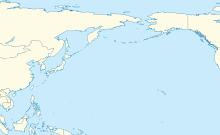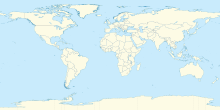Wonju Airport
Appearance
Wonju Airport 원주공항 原州空港 Wonju Gonghang Wŏnju Konghang | |||||||||||
|---|---|---|---|---|---|---|---|---|---|---|---|
 | |||||||||||
| Summary | |||||||||||
| Airport type | Public / Military | ||||||||||
| Owner | Ministry of Land, Infrastructure and Transport | ||||||||||
| Operator | |||||||||||
| Serves | Wonju | ||||||||||
| Location | Hoengseong County, Gangwon Province, South Korea | ||||||||||
| Opened | 28 February 1997 | ||||||||||
| Elevation AMSL | 330 ft / 101 m | ||||||||||
| Coordinates | 37°27′33″N 127°58′37″E / 37.45917°N 127.97694°E | ||||||||||
| Website | http://wonju.airport.co.kr/eng/index.jsp | ||||||||||
| Map | |||||||||||
 | |||||||||||
| Runways | |||||||||||
| |||||||||||
| Statistics (2019) | |||||||||||
| |||||||||||
Source:airport.kr[1] | |||||||||||
Wonju Airport is an airport in Hoengseong County, Gangwon province, South Korea (IATA: WJU, ICAO: RKNW). During the Korean War it was designated K-46 (Hoengseong Air Base) by the United States Air Force. In 2011, 70,943 passengers used the airport, which is mainly for military use.[1]
Only one parking position is large enough for a Boeing 737-900. The airport has a daily scheduled flight two times, currently operated by Jin Air to Jeju.
Because Wonju Airport is sharing with the military, taking photograph or video of apron, runway and military facility is strictly prohibited.
Wonju Airport's passenger terminal is 1.5 km from the airport runway, requiring passengers to take a shuttle bus (about 20 minutes) to their aircraft.[2]
Airlines and destinations
| Airlines | Destinations |
|---|---|
| Jin Air | Jeju[3] |
Statistics
Graphs are unavailable due to technical issues. There is more info on Phabricator and on MediaWiki.org. |
Annual passenger traffic at WJU airport.
See Wikidata query.
| Air traffic statistics | |||
|---|---|---|---|
| Aircraft operations | Passenger volume | Cargo tonnage | |
| 2001 | 1,280 | 73,491 | 173 |
| 2002 | 615 | 29,621 | 108 |
| 2003 | 715 | 58,355 | 368 |
| 2004 | 960 | 95,422 | 539 |
| 2005 | 694 | 75,514 | 476 |
| 2006 | 694 | 80,361 | 516 |
| 2007 | 687 | 79,102 | 509 |
| 2008 | 706 | 78,754 | 534 |
| 2009 | 706 | 74,201 | 473 |
| 2010 | 673 | 70,522 | 438 |
| 2011 | 696 | 72,226 | 430 |
| 2012 | 704 | 82,759 | 486 |
| 2013 | 688 | 79,719 | 455 |
| 2014 | 689 | 76,150 | 447 |
| 2015 | 706 | 75,146 | 444 |
| 2016 | 699 | 78,567 | 431 |
| 2017 | 705 | 81,560 | 459 |
| 2018 | 690 | 85,725 | 473 |
| 2019 | 904 | 111,485 | 619 |
| 2020 | 404 | 37,729 | 213 |
| 2021 | 1,212 | 132,339 | 713 |
| 2022 | 1,400 | 193,239 | 1,030 |
| Source: Korea Airports Corporation Traffic Statistics[4] | |||
Ground transportation
Bus
- ● No. 2 : Hoengseong Bus Terminal ↔ Wonju Airport ↔ Wonju station ↔ Wonju City ↔ Gwanseol-dong
- ● No. 2-1 : Hoengseong Bus Terminal ↔ Wonju Airport ↔ Wonju City ↔ Gwanseol-dong
References
- ^ a b "South Korea Traffic Statistics". airport.kr.com.
- ^ "Official Site of Korea Tourism Org.: Wonju Airport". english.visitkorea.or.kr. Retrieved 2019-06-21.
- ^ "진에어, 원주~제주 노선 다음 달 8일 신규 취항" (in Korean). Korean Broadcasting System. 25 September 2020.
- ^ "Air Traffic Statistics". Incheon International Airport. Archived from the original on 2020-01-14. Retrieved 23 July 2023.




